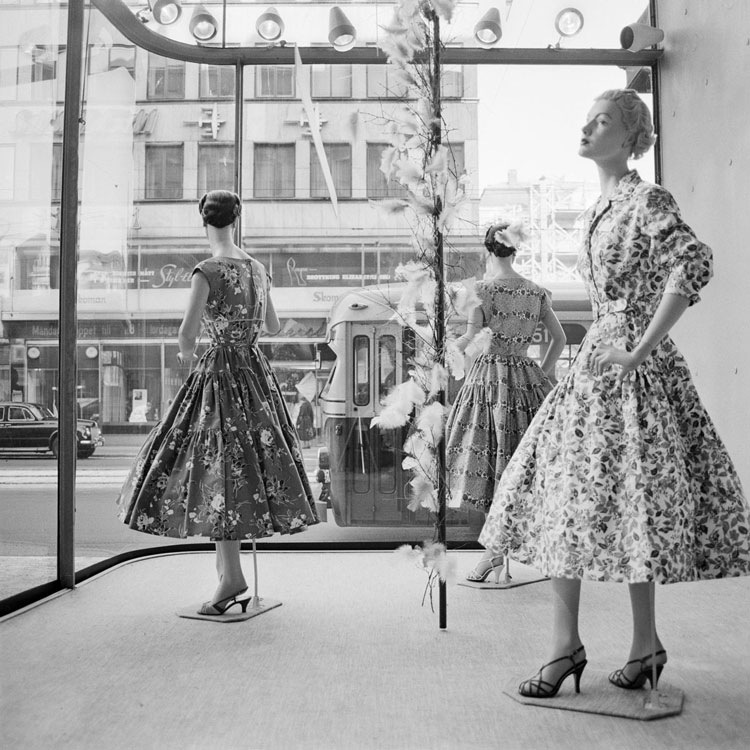 What’s that old saying—clothes make the man? Our culture seems a bit preoccupied with clothes. Some people spend a lot of time and money being concerned about what they wear, while others are concerned about what their neighbor is wearing. Women especially tend to notice, have opinions about and often judge others on their choice of attire. Now, I’m not knocking those who have an interest in fashion, because most of us would prefer to find clothing that flatters us as opposed to clothing that does not. What I’m really referring to are those folks obsessed about the material that they and others cover themselves with, for their concern is mis-directed.
What’s that old saying—clothes make the man? Our culture seems a bit preoccupied with clothes. Some people spend a lot of time and money being concerned about what they wear, while others are concerned about what their neighbor is wearing. Women especially tend to notice, have opinions about and often judge others on their choice of attire. Now, I’m not knocking those who have an interest in fashion, because most of us would prefer to find clothing that flatters us as opposed to clothing that does not. What I’m really referring to are those folks obsessed about the material that they and others cover themselves with, for their concern is mis-directed.
As with most subjects in life, God’s word has a few things to say about clothing. It mentions two types, and we put on both. The first has little significance and should not concern us overly much. But the second is extremely important, and one we should give our full attention to, as our eternal destiny is at stake.
In the Gospel of Luke, we are told not to worry so much about our physical clothing since God knows we need it and he supplies what we need.
Then Jesus said to his disciples: “Therefore I tell you, do not worry about your life, what you will eat; or about your body, what you will wear… Consider how the wild flowers grow. They do not labor or spin. Yet I tell you, not even Solomon in all his splendor was dressed like one of these. If that is how God clothes the grass of the field, which is here today, and tomorrow is thrown into the fire, how much more will he clothe you—you of little faith!” Luke 12:22, 27-28, NIV
In the book of Matthew however, Jesus describes a very different type of clothing that we should be concerned about, as he shares the parable of the wedding supper.
“The kingdom of heaven is like a king who prepared a wedding banquet for his son… But when the king came in to see the guests, he noticed a man there who was not wearing wedding clothes. He asked, ‘How did you get in here without wedding clothes, friend?’ The man was speechless”… Matthew 22:2, 11-12, NIV
Intrigued by this passage, I wanted to do a word-study to better understand of how the idea of “spiritual clothing” is used in both the Old and New Testaments.
Isaiah 64 describes our natural state as unclean, and calls our “spiritual clothes” nothing but filthy rags.
All of us have become like one who is unclean, and all our righteous acts are like filthy rags; we all shrivel up like a leaf, and like the wind our sins sweep us away. Isaiah 64:6, NIV
It is interesting that the Hebrew word for “filthy” is found only here, and comes from a root that refers to the soiling caused during menstruation. Our righteous acts are akin to being wrapped in blood-stained garments. This verse also points back to Levitical law where menstruating women were labeled unclean and separated from the population. As unclean things, our sin separates us from God.
Zechariah gives a fascinating account of a conversation in heaven, and describes a vivid change of clothes for Joshua, to symbolize how Jesus removes our sin and gives us new spiritual clothes.
Now Joshua was dressed in filthy clothes as he stood before the angel. The angel said to those who were standing before him, “Take off his filthy clothes.” Then he said to Joshua, “See, I have taken away your sin, and I will put fine garments on you.” Zechariah 3:3-4, NIV
The Hebrew word translated here as “taken away” means “to cover, bring over or through, deliver, or to pass over,” showing that we are delivered from punishment when our sins are removed.
Isaiah 61 illustrates the importance of our new spiritual clothes, describing them as “garments of salvation” and comparing them to the fine adornments worn by brides and grooms.
I delight greatly in the LORD; my soul rejoices in my God. For he has clothed me with garments of salvation and arrayed me in a robe of his righteousness, as a bridegroom adorns his head like a priest, and as a bride adorns herself with her jewels. Isaiah 61:10, NIV
The most interesting part of this verse is that the Hebrew word translated as “arrayed” in the NIV is only found here. In the King James Version the phrase is “he hath covered me” and it means to clothe or cover, which is straight forward enough. But there are other words for clothed that are used more often. The fact that this word is found only here seems to imply that this type of covering is unique to God alone. I believe the phrase can be read in two ways—the first depicting an act of covering, and the second showing that it is God himself who serves as the cover. Elsewhere in the Bible God is described as a place of refuge, a shield, a shelter, or a set of wings under which we might remain hidden. It seems likely that this verse would carry the same meaning, that God covers us with himself.
Many New Testament verses use a Greek word for “clothed” which means “the sense of sinking into a garment, to invest with clothing, or to put on.”
Therefore, as God’s chosen people, holy and dearly loved, clothe yourselves with compassion, kindness, humility, gentleness and patience. Colossians 3:12, NIV
Rather, clothe yourselves with the Lord Jesus Christ, and do not think about how to gratify the desires of the flesh. Romans 13:14, NIV
So in Christ Jesus you are all children of God through faith, for all of you who were baptized into Christ have clothed yourselves with Christ. Galatians 3:26-27, NIV
While these verses admonish us to apply Christ-like characteristics to our own lives, could they also allude to the role of Christ as a covering? If his righteousness is applied to us then in essence, Jesus is the garment we wear. This points us back to the concept recorded in Isaiah implying that God not only covers us, but he covers us with himself.
So why is this important? Let’s go back to the wedding supper. The king prepares a lavish banquet for his son. As the guests arrive, he spots a man not wearing a wedding garment. He asks the man how he got into the event without the proper attire. The man is speechless. The king tells his servants to escort the man out of the hall.
Then the king told the attendants, ‘Tie him hand and foot, and throw him outside, into the darkness, where there will be weeping and gnashing of teeth.’ For many are invited, but few are chosen. Matthew 22:2, 13-14, NIV
Wow—brutal consequences for not having on the right outfit! The Greek word translated “tie” means “to bind, or to put under obligation of the law.” This is very telling, since the law is what those without Christ will be judged by. And the word for “outer” means “the darkness outside the limits of the lighted palace,” to which the Messiah’s kingdom is likened to here.
The poor fool. Where did he go wrong? Well, basically, he accepted the king’s invitation but rejected the garment the king provided for his attendance. He refused to wear what was necessary to gain admittance, but instead chose to wear his own soiled and filthy rags which were clearly unacceptable. Perhaps, believing himself to be a “good person,” the man thought he was entitled to access regardless of what he wore. Oh, how much that sounds like many of us today—convinced our lives are just fine with God, based on some standard of our own making. Jesus admonished the Pharisees in his day, for just this sort of thinking.
“Woe to you, teachers of the law and Pharisees, you hypocrites! You are like whitewashed tombs, which look beautiful on the outside but on the inside are full of the bones of the dead and everything unclean. In the same way, on the outside you appear to people as righteous but on the inside you are full of hypocrisy and wickedness.” Matthew 23:27-28, NIV
Like the wedding supper guest, the Pharisees didn’t take the subject of spiritual clothing seriously either. They arrayed themselves in their own righteousness, giving an appearance of godliness, but were just as adorned in filthy rags as the man. World religions try to manufacture, construct or sew together their own garments by following certain rules, observing certain customs, or completing certain tasks. While some of these activities, like feeding the poor are good in of themselves, they are not the means by which we are made righteous. Legalism is trying to sew together our own garment to come before the king.
A good example of someone trying to live up to religious legalism is Saul of Tarsus. Saul was a Pharisee, a teacher of the law, and therefore a good keeper of the law. He knew all the rules and followed them, but was dependent upon his own ability to keep himself in good standing with God. However, one day on the road to Damascus he found that his religious rule-keeping fell quite short of the mark. Alone, we are all dressed as dirty paupers, and quite unfit to stand in the presence of a holy God.
As explained so well in Isaiah, a holy God cannot abide with us while we are still mired in our sin. The filthy rags that wrap our frame keep us at a distance that we cannot traverse. We cannot approach God with our own righteousness which is akin to wearing clothes of our own design, made by our own hand. To enter God’s presence only one garment is acceptable—the covering provided by Jesus which he purchased with his own blood. Those trying to enter heaven clothed in their own righteousness will be turned away, but those who accept Christ as their savior will be clothed with salvation and one day, will be welcomed into the King’s presence at the supper of the Lamb.
Indeed, Revelation 19 describes the Bride of Christ dressed in fine linen, clean and white.
Then I heard what sounded like a great multitude, like the roar of rushing waters and like loud peals of thunder, shouting: “Hallelujah! For our Lord God Almighty reigns. Let us rejoice and be glad and give him glory! For the wedding of the Lamb has come, and his bride has made herself ready. Fine linen, bright and clean, was given her to wear.” (Fine linen stands for the righteous acts of God’s holy people.) Revelation 19:6-8, NIV
Wow—what a day that will be!
In the case of spiritual attire, clothes really do make the man (or woman)!
On the journey toward Home,











